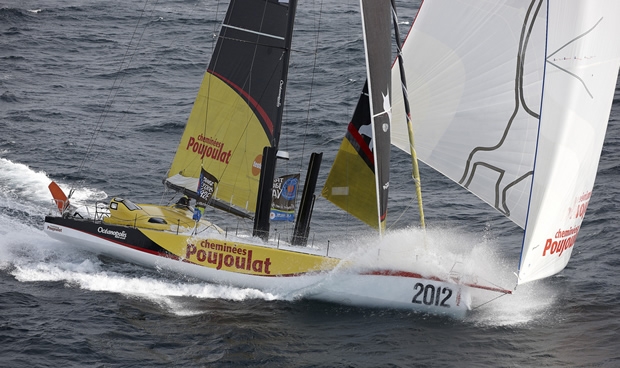
Cheminees Poujoulat breaks up in storm
Swiss solo round the world skipper Bernard Stamm and Damien Guillou are lucky to be alive this morning.
Last night Stamm’s IMOCA 60 Cheminees Poujoulat broke in two as she was battered by storm force conditions in the Western Approaches. In the pitch black, as a Royal Navy helicopter attempted a rescue, the boat's liferaft was damaged, leaving the crew clinging to the broken hull of the submerged vessel for the duration of the night. Thankfully this morning both Stamm and Guillou have since been successfully rescued and are safely on board a container ship bound for Rotterdam.
Cheminees Poujoulat at the time of the incident was lying 180 miles WSW of the Scilly Isles, nearing the end of her delivery back to her homeport of Brest, France from the end of the Transat Jacques Vabre in Itajai, Brazil.

As the EPIRB was registered in the UK, and due to the proximity of the vessel, MRCC Falmouth took over co-ordination of the rescue, following their receipt of the distress message at 1851 yesterday evening. Having found out details of the yacht, the MRCC spoke to the crew by sat phone and were told that the yacht’s mast "was breaking away and that they were taking water".
Two helicopters were scrambled, a Royal Navy one from RNAS Culdrose near Helston, and an RAF helicopter from Chivenor, however the latter developed a fault and was forced to land in a field in Cornwall. 180 miles out from the Scilly Isles represented the maximum range of the Royal Navy helicopter, despite stopping to refuel in the Scilly Isles. Meanwhile the French rescue authorities sent up a Falcon aircraft to provide top cover. Despite it being dark and extremely stormy, the French plane located the stricken boat at around midnight and was able to guide the helicopter to Cheminees Poujoulat’s location, arriving on the scene at 0030.
By this time in the Force 10 winds and 6-7m swell, the IMOCA 60 had broken in half and as her crew attempted to get into their liferaft it was damaged between the two parts of the hull. Sadly, only able to spend a maximum of 30 minutes on station, the helicopter was forced to return to refuel just before 0100, leaving Stamm and Guillou stranded on their increasingly broken yacht with no means of escape.

Thankfully the IMOCA 60 is fitted with watertight bulkheads which did their job and served to keep the vessel afloat.
Throughout the evening the MRCC in Falmouth had been issuing satellite broadcasts in an attempt to establish if any vessels in the area would be able to assist the Franco-Swiss crew.
“Several vessels came back that the conditions were so bad, they couldn’t deviate, they were hove to in the storm,” recounts Alan Loveday, Watch Officer at the MRCC Falmouth.
However one did. The Norwegian Greig Star operated 36,000 tonne cargo ship, Star Isfjord responded. 30 nautical miles away at the time, she was able to make 3 knots towards Cheminees Poujoulat and arrived on the scene at 0400 this morning. It then took the Norwegian crew two hours to effect a rescue, made no easier by the horrendous conditions and the yacht having no usable liferaft. Just after 0600 the crew was successfully recovered after a line had been secured between the ship and the broken yacht, despite the wind still blowing at Force 8 with the seas 8 metres.
At present it is unclear exactly how Stamm and Guillou were recovered. However they are now safely on board the Star Isfjord which is due to dock in Rotherdam at midnight tonight.
“It was a brilliant piece of seamanship and endeavour,” commented Loveday.










Latest Comments
Add a comment - Members log in